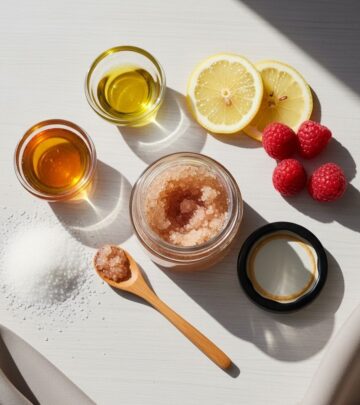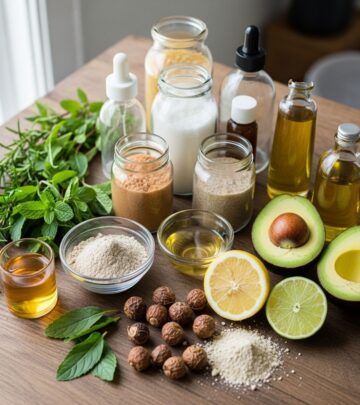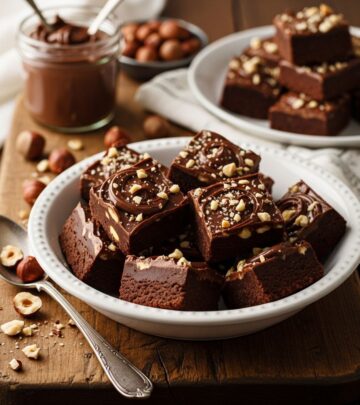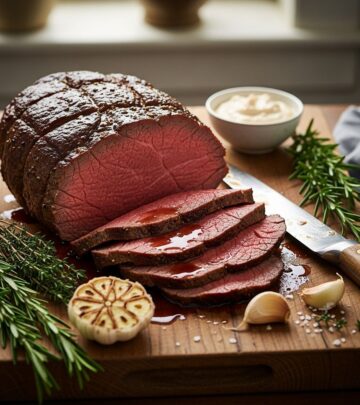Zaatar-Roasted Carrot Dip: A Delicious Twist on Traditional Appetizer Spreads
A creamy spice-kissed spread that turns veggies into an irresistible colorful sensation.
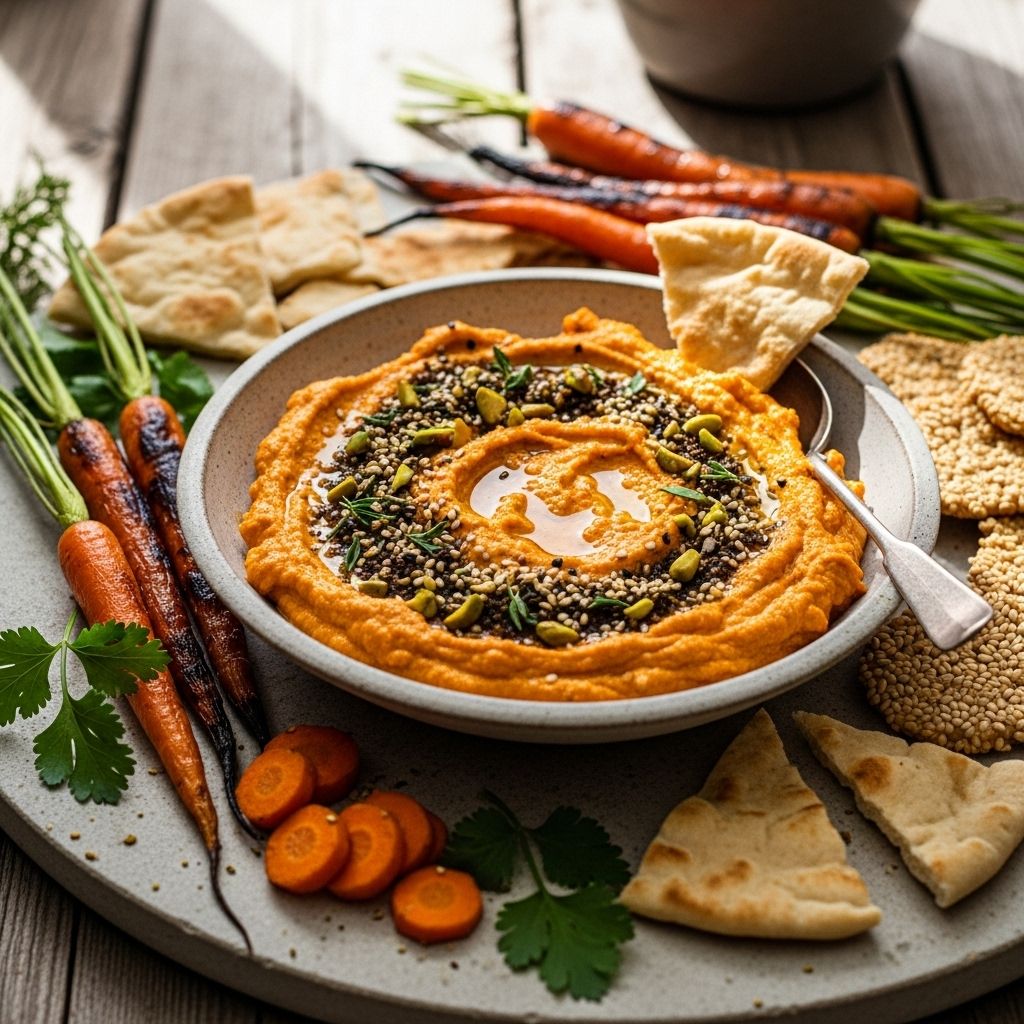
Zaatar-Roasted Carrot Dip: A Bold and Flavorful Appetizer
If you are searching for a vegetable-based dip that’s as vibrant as it is satisfying, this zaatar-roasted carrot dip delivers a complex blend of earthy, spicy, and tangy flavors. Drawing inspiration from Middle Eastern cuisine, the dip features roasted carrots seasoned with zaatar—a classic spice blend—blended to creamy perfection and finished with rich toppings that add visual and textural appeal.
Why Carrot Dip?
Vegetable dips are sometimes overshadowed by classic hummus or baba ganoush, but carrots, when roasted, transform with intense sweetness, depth, and savory character. Combined with aromatic spices, they become the perfect base for a healthy and crowd-pleasing starter or snack.
- Rich roasted flavor: Roasting coax sweet and caramelized notes from carrots.
- Vibrant color brings visual appeal to any table.
- Nutritious: Packed with fiber, beta carotene, and vitamins.
- Versatile: Serve with pita, crudités, or as a sandwich spread.
This recipe not only honors the humble carrot but elevates it with depth and a Middle Eastern heritage, thanks to zaatar.
What Is Zaatar?
Zaatar is a Middle Eastern spice blend combining dried thyme, oregano, marjoram, sumac, and toasted sesame seeds. Sometimes, additional spices like cumin and coriander are included. Its herbaceous flavor, lemony brightness (from the sumac), and nutty undertones make it perfect for vegetables, flatbreads, and dips.
- Core ingredients: Thyme, oregano, marjoram, sumac, sesame seeds
- Flavor profile: Earthy, tangy, nutty
- Uses: Sprinkle over roasted meats, vegetables, or mix into dips and salads
The unique character of zaatar brings out the sweetness of carrots while introducing complex aromatics to the dip.
Recipe Overview: Zaatar-Roasted Carrot Dip
This appetizer pairs the sweet depth of roasted carrots with zingy lemon, nutty tahini, and, of course, zaatar. The ingredients are simple, but the process ensures every element brings maximum flavor to the final spread.
Ingredients
| Ingredient | Amount | Purpose |
|---|---|---|
| Carrots | 1 pound (450g), peeled & cut | Main vegetable base |
| Olive Oil | 3 tbsp (divided) | Roasting, flavor, blending |
| Zaatar Spice Blend | 2 tbsp (plus extra for garnish) | Spice, aromatics |
| Lemon Juice | 2 tbsp (plus wedges for serving) | Acidity, brightness |
| Tahini | 2 tbsp | Creaminess |
| Sweet Paprika | 1 tsp | Earthy, sweet spice |
| Salt & Black Pepper | To taste | Seasoning |
| Fresh Parsley or Cilantro | 2 tbsp, chopped | Herbal garnish |
Toppings (Optional, Highly Recommended)
- Crumbled feta or soft goat cheese
- Toasted sesame seeds
- Additional zaatar
- Drizzle of olive oil
- Fresh herbs
Step-by-Step: Zaatar Roasted Carrots
Roasting carrots is essential to intensify their natural sweetness and ensure the dip’s smooth texture. Here’s a walk-through on preparing the base:
- Preheat oven to 425°F (218°C).
- Slice carrots into 1/2-inch coins or sticks for fast, even roasting.
- On a baking sheet, toss carrots with 2 tbsp olive oil, 1 1/2 tbsp zaatar, salt, & pepper.
- Spread carrots in a single layer without crowding.
- Roast for 25–30 minutes until tender, caramelized, and slightly crisp at the edges. Turn halfway for even roasting.
- Let carrots cool slightly before blending. This preserves texture and keeps the dip from turning gummy.
The roasted carrots are ready for blending—rich in flavor with balanced notes of spice and sweetness.
How to Make the Dip: Blending for Texture and Flavor
This dip is noteworthy for its lusciously smooth texture. The natural starch and fiber in carrots create creaminess without heavy dairy. The following steps ensure a perfectly textured spread:
- Add roasted carrots to a food processor or blender.
- Include remaining olive oil, tahini, lemon juice, paprika, and more zaatar.
- Blend until very smooth, pausing to scrape down sides as needed.
- Taste and adjust salt, lemon juice, or additional olive oil as needed for balance.
- Chill dip if desired: While not required, chilling helps flavors meld and texture firm up. Serve at room temperature or slightly cool.
You may adjust consistency by adding a splash of water or more olive oil if the dip appears too thick.
Serving Ideas and Presentation
- Spoon dip into a shallow bowl or plate and swirl with the back of a spoon to create texture.
- Top with crumbled feta or goat cheese for creaminess and tang.
- Sprinkle extra zaatar, toasted sesame seeds, and herbs.
- Drizzle with good-quality olive oil for richness.
- Add lemon wedges for guests to squeeze fresh juice.
Pair with crisp pita chips, warm flatbreads, seeded crackers, or crunchy vegetable crudités. The vivid orange color and leafy green garnish make a stunning contrast on your table.
Make-Ahead and Storage Tips
- Prep in advance: Dip may be made up to 3 days ahead and stored in an airtight container in the refrigerator.
- Garnishes: Add toppings just before serving for best texture.
- Freezing: While possible, freezing may alter texture. For best quality, enjoy fresh.
- Leftovers: Use as a sandwich spread, in wraps, on grain bowls, or even as a base for a salad dressing (thinned with extra lemon juice and olive oil).
Recipe Variations and Substitutions
| Ingredient | Substitution | Effect |
|---|---|---|
| Carrots | Parsnips, sweet potatoes | Sweeter, earthier flavor |
| Za’atar | Italian herbs + extra sumac | Herbal but less authentic Middle Eastern taste |
| Tahini | Greek yogurt, almond butter | Lighter or nuttier spread |
| Feta | Crumble goat cheese, labneh | Milder, creamier |
You can personalize the dip with hot paprika for added spice, a touch of honey for sweetness, or chili flakes for heat. The dip can easily be made vegan and gluten-free by omitting dairy toppings and choosing gluten-free dippers.
Nutritional Benefits
- Carrots: Rich in vitamin A, antioxidants, fiber, and beta-carotene to support vision and immune health.
- Zaatar: Contains antioxidant-rich herbs and seeds, supporting anti-inflammatory benefits.
- Tahini and olive oil: Provide healthy fats and plant-based protein.
- Low in sugar, vegetarian, easy to adapt for vegan or gluten-free diets.
Tips for Success
- Roast carrots until fully caramelized: Undercooked carrots create a bland, chunky dip; deeply roasted carrots deliver flavor.
- Taste as you blend: Adjust lemon juice, salt, and zaatar until the flavors are vibrant and balanced.
- Thick or thin dip as desired: A splash of water, oil, or lemon juice can refine consistency.
- Fresh zaatar for best results: Old spices taste musty; seek a fresh, brightly colored blend.
Frequently Asked Questions (FAQs)
Q: Can I make zaatar-roasted carrot dip without a food processor?
A: Yes, but use a blender for the smoothest texture. Alternatively, you can mash the roasted carrots by hand for a rustic, chunky dip.
Q: Is zaatar mix gluten-free?
A: Most traditional zaatar blends are gluten-free, but always check for added fillers in commercial products.
Q: How should I store leftover carrot dip?
A: Store in an airtight container in the refrigerator for up to 3 days. Add garnishes fresh before serving again.
Q: What is the best type of carrot for this recipe?
A: Standard orange carrots work best, but rainbow or heirloom varieties can create a multi-colored, sweet result.
Q: Can I freeze the dip?
A: While possible, freezing changes texture. It’s best enjoyed fresh or refrigerated.
Conclusion: Middle Eastern Magic in a Modern Dip
This zaatar-roasted carrot dip captures the spirit of Middle Eastern cooking—balancing spice, sweetness, and vibrant flavor in every bite. With its bold color and adaptability, it’s perfect for festive gatherings, healthy snacking, or adding interest to everyday meals. Whether you’re a fan of classic hummus or seeking new vegetarian appetizers, this dip deserves a place in your repertoire.
Try it with homemade pita chips, alongside grilled meats, or as a base for breakfast bowls—the possibilities are only as limited as your imagination.
Read full bio of Sneha Tete


